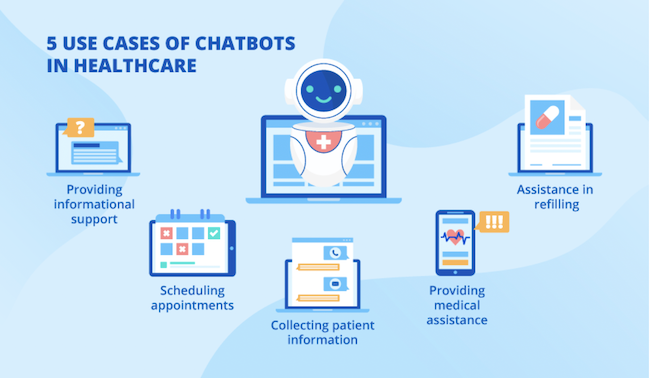Chatbots in healthcare incorporate artificial intelligence and machine learning principles to reduce human input while simultaneously improving the quality of healthcare diagnoses. This tech automates the lower-level, repetitive tasks usually allocated to healthcare reps.
Chatbots can handle monotonous healthcare tasks without a decline in quality. It allows healthcare professionals to focus on more critical duties and improve the quality of patient care.
In 2021, the healthcare chatbot market was worth
USD 184.60 million. This staggering number begs the question, "are chatbots good or bad for the healthcare industry?"
Here, we take a closer look at both sides of the equation.
Chatbots in Healthcare: The Good
Here's why the healthcare chatbot market is estimated to reach over USD 431 million in 2028.
Monotonous Yet Tireless
Chatbots can perform the most repetitive tasks daily. The human factor means mistakes are bound to happen. But thanks to the very nature of AI, this possibility is improbable. Chatbots can improve the following healthcare tasks:
- Data gathering
- Scheduling appointments
- Creating and editing medical records
- Insurance payment processes
Telehealth Applications
Chatbots, in the form of virtual assistants, reduce the need for patients to visit the hospital. Instead, patients can ask questions and get valuable information promptly by interacting with chatbots accessible via an
omnichannel call center.
Healthcare Companions
Uniquely programmed chatbots can provide social interaction for patients managing depression, loneliness, and anxiety. The anonymous nature of such conversations allows patients to discuss emotional problems without judgment.
Improved Diagnostic Accuracy
Certain aspects of healthcare chatbot development focus on isolating new knowledge through large data sets. Machine learning allows chatbots to gain experience from real-life conversations, delivering improved recommendations over time and
boosting workplace productivity.
Patient Monitoring
Chatbots can evaluate a patient's progress during follow-up sessions by asking pre-set questions. And the tech can schedule in-office appointments for situations that demand further care.

Image Source
The Downsides to Chatbots in Healthcare
The main drawbacks of chatbot implementation in healthcare include the following:
Increases Costs
Cost is one of the most critical
parts of a business proposal. And any proposal to incorporate chatbots into healthcare services should consider the astronomical costs of developing algorithms and hiring specialist chatbot programmers.
Incomplete Health Assessments
Chatbots are currently unable to decipher body language. Plus, short gaps in conversations with a chatbot may mean having to start the interaction from the top. And with zero ability to display empathy in varied scenarios, the current AI tech isn't good enough to completely replace visits to a healthcare professional.
Hacking
Chatbots collect raw information from interactions with different patients. This private information can be of a medical or financial nature. Typically, chatbots store this information digitally - a medium susceptible to data hacks and privacy breaches.
Zero Accountability
Despite the foundational principle of chatbots in healthcare, an AI-patient relationship lacks the trust a doctor-patient relationship offers.
So, Are Chatbots in Healthcare Good or Bad?
The information above proves there are multiple complexities to using chatbots in healthcare. Consequently, it's important to approach their use professionally and ethically.
Integrating chatbots into healthcare processes can reduce mistakes, improve workflow efficiency, and boost patient outcomes. Nonetheless, poor AI implementation in healthcare can cause improper healthcare practices with negative implications for patients and professionals.
Opinions expressed by the author are not necessarily those of WITI.
Are you interested in boosting your career, personal development, networking, and giving back? If so, WITI is the place for you! Become a WITI Member and receive exclusive access to attend our WITI members-only events, webinars, online coaching circles, find mentorship opportunities (become a mentor; find a mentor), and more!
Founded in 1989, WITI (Women in Technology International) is committed to empowering innovators, inspiring future generations and building inclusive cultures, worldwide. WITI is redefining the way women and men collaborate to drive innovation and business growth and is helping corporate partners create and foster gender inclusive cultures. A leading authority of women in technology and business, WITI has been advocating and recognizing women's contributions in the industry for more than 30 years.
The organization delivers leading edge programs and platforms for individuals and companies -- designed to empower professionals, boost competitiveness and cultivate partnerships, globally. WITI’s ecosystem includes more than a million professionals, 60 networks and 300 partners, worldwide.
WITI's Mission
Empower Innovators.
Inspire Future Generations.
Build Inclusive Cultures.
As Part of That Mission WITI Is Committed to
Building Your Network.
Building Your Brand.
Advancing Your Career.


Comments